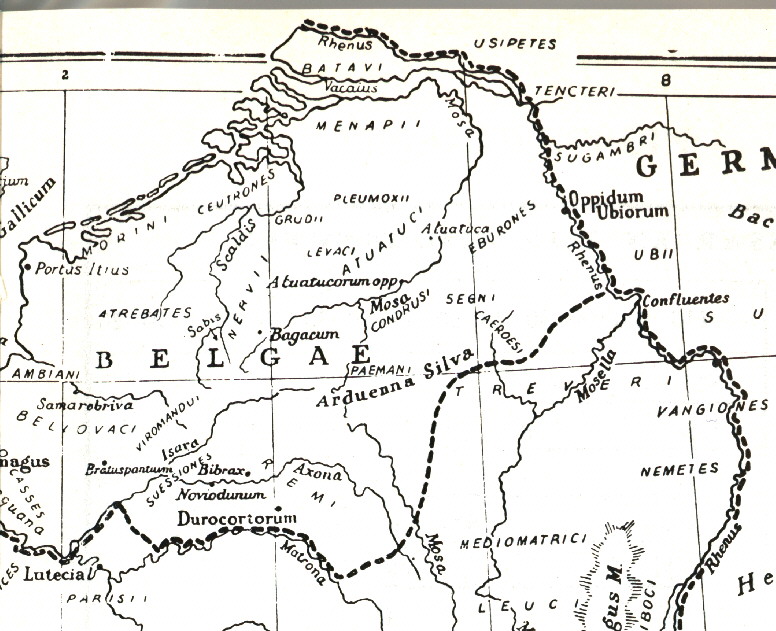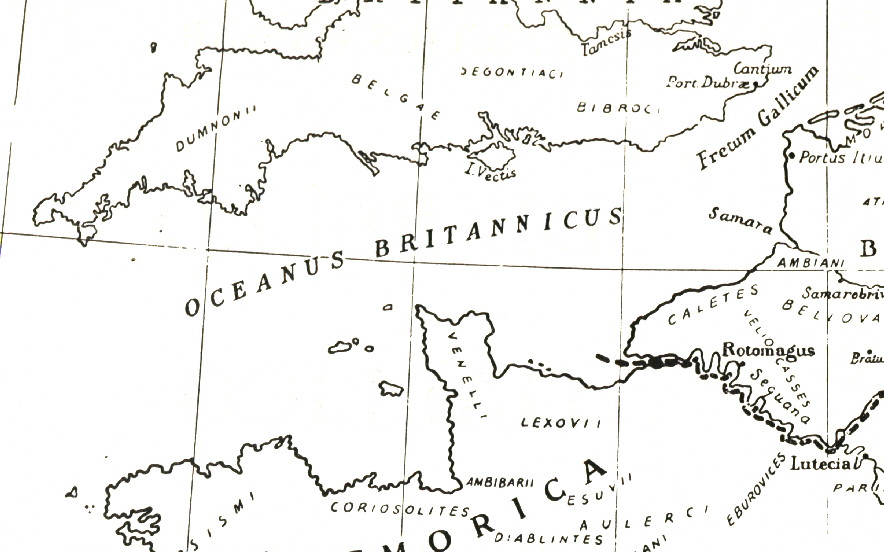
| GALLIA EST OMNIS DIVISA IN PARTES
TRES QVARVM VNAM INCOLVNT BELGAE ALIAM AQVITANI TERTIAM QVI IPSORVM LINGVA CELTA NOSTRA GALLI APPELLANTVR |
(I,1) Gaul is a whole divided into three parts, one of which is inhabited by the Belgae, another by the Aquitani, and a third by a people called in their our tongue Celtae, in the Latin Galli. | ||
| HI OMNES LINGVA INSTITVTIS LEGIBVS INTER SE DIFFERVNT | All these are different one from another in language, institutions, and laws. | ||
| GALLOS AB AQVITANOS GARVMNA FLVMEN A BELGIS MATRONA ET SEQUANA DIVIDIT |
The Galli (Gauls) are separated from the Aquitani by the river Garonne, from the Belgae by the Marne and the Seine. | ||
| HORVM OMNIVM FORTISSIMI SVNT BELGAE PROPTEREA QVOD A CVLTV ATQVE HVMANITATE PROVINCIAE LONGISSIME ABSVNT MINIMEQVE AD EOS MERCATORES SAEPE COMMEANT ATQVE EA QVAE AD EFFEMINANDOS ANIMOS PERTINENT IMPORTANT PROXIMISQVE SVNT GERMANIS QVI TRANS RHENVM INCOLVNT QVIBVSCVM CONTINENTER BELLVM GERVNT |
Of all these people the Belgae are the most courageous, because they are farthest removed from the culture and the civilisation of the Province (of Gallia Narbonensis), and least often visited by merchanys introducing the commodities that make for effeminacy; ald also because they are nearest to the Germans dwelling beyond the Rhine, with whom they are continually at war. | ||
| BELGAE AB EXTREMIS GALLIAE FINIBVS ORIVNTVR PERTINENT AD INFERIOREM PARTEM FVLMINIS RHENI SPECTANT IN SEPTENTRIONEM ET ORIENTEM SOLEM | The Belgae, beginning from the edge of the Gallic territory, reach to the lower part of the river Rhine, bearing towards the north and east. |
| BRITTANIA PARS INTERIOR AB
EIS INCOLITVR QVOS NATOS IN INSVLA IPSI MEMORIA PRODITVM DICVNT MARITIMA PARS
AB EIS QVI PRAEDAE AC BELLI INFERENDI CAVSA EX BELGIO TRANSIERVNT - QVI OMNES FERE EIS NOMINIBVS CIVITATVM APPELLANTVR QVIBVS ORTI EX CIVITATIBVS EO PERVENERVNT - ET BELLO ILLATO IBI PERMANSERVNT ATQVE AGROS COLERE COEPERVNT |
(V,12) The inland part of Britain is inhabited by tribes declared in their own tradition to be indigenous to the island, the maritime part by tribes that migrated at an earlier time from Belgium to seek booty by invasion. Nearly all of these latter are called after the names of the states from which they sprang when they went to Britain; and after the invasion they abode there and began to till the fields. |
Quoted from:
Below: 2 excepts "Belgae" (167 k) and "West Belgae" (112 K), scanned details from the map "Gallia Caesaris temporibus", p. 2-3 in "De Bello Gallico", uitgegeven en voorbereid door H. Van Looy, 8e druk, Antwerpen, 1988.

